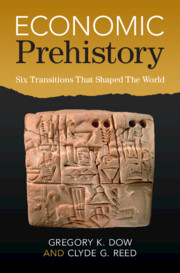Book contents
- Economic Prehistory
- Economic Prehistory
- Copyright page
- Dedication
- Contents
- Figures
- Tables
- Preface
- Acknowledgments
- Abbreviations
- Part I Prologue
- Part II Sedentism and Agriculture
- Part III Inequality and Warfare
- Part IV Cities and States
- 9 Mesopotamian City-States
- 10 Mesopotamian City-States
- 11 The Emergence of Cities and States
- Part V Epilogue
- References
- Author Index (Abridged)
- Subject Index
10 - Mesopotamian City-States
A Formal Model
from Part IV - Cities and States
Published online by Cambridge University Press: 10 February 2023
- Economic Prehistory
- Economic Prehistory
- Copyright page
- Dedication
- Contents
- Figures
- Tables
- Preface
- Acknowledgments
- Abbreviations
- Part I Prologue
- Part II Sedentism and Agriculture
- Part III Inequality and Warfare
- Part IV Cities and States
- 9 Mesopotamian City-States
- 10 Mesopotamian City-States
- 11 The Emergence of Cities and States
- Part V Epilogue
- References
- Author Index (Abridged)
- Subject Index
Summary
This chapter constructs a formal model of our hypothesis from Chapter 9 about the rise of Uruk. We assume there are many open sites where people can obtain food by foraging, farming, or pastoralism. There is also one site controlled by a local elite. We start from an equilibrium with mild stratification, reflecting the conditions of the ’Ubaid period. A climate shift toward increasing aridity reduces the productivities of sites dependent on rainfall but does not affect the productivity of the elite-controlled site where irrigation is based on river water. This lowers commoner food income and shifts population toward elite-controlled land. The declining standard of living for commoners makes it profitable for the elite to create urban workshops producing textiles and other goods, where manufacturing has aggregate increasing returns to scale. The taxation of manufacturing allows the elite to enforce monopolistic output restrictions, driving up the price of manufactured goods and driving down the wage. Organized elites may want to establish city-states based upon manufacturing even if they lack interest in public goods, because taxation can be used to enhance private elite consumption. The key tradeoff for the elite involves profit from manufacturing versus land rent from agriculture.
Keywords
- Type
- Chapter
- Information
- Economic PrehistorySix Transitions That Shaped The World, pp. 392 - 434Publisher: Cambridge University PressPrint publication year: 2023

